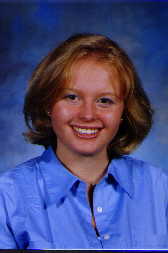STUDENTS GET INVOLVED: DARA
MERSKY

Students can get involved in the Genesis mission in lots
of ways—even with their music! Dara Mersky was 17 years
old and a high school student when she composed the pieces
that became the musical signature for the Genesis mission
video, Testing to Assure Mission Success: A Look Inside
Los Alamos National Laboratory.
| Dara, age 17 |

Hear Dara's music |
| "I'm grateful that I
was able to contribute to something so worthwhile." |
|
|
The following interview occurred
between Dara (then a college sophomore) and Genesis
outreach team member Jacinta Behne on November 29, 2002. |
JB: How long have you been studying the piano
and at what point did you start to compose your own music?
DM: I've been taking lessons for about 10
or 12 years, and it started out that I would hear my mom or
dad play a song and I would play by ear. I took lessons pretty
much from age eight all the way through high school. I started
figuring out things on my own, putting together chord progressions
that I thought sounded pretty good, and that was around age
15. From there I built on that, and took short pieces, putting
them together. The first composition that had a title was
an Irish tune that was a compilation various instruments,
formatted on the keyboard as a piece.
JB: Your compositions titled "Unrequited"
and "Flight of Fancy" were chosen for the Genesis "Testing
to Assure Mission Success" video. Is there a story behind
those two musical pieces?
DM: They were written about a year apart.
It was summertime, and I was 16 when
I wrote Flight of Fancy first. It was really just me sitting
down at the piano and putting together things that I had heard
before. I began by testing things out, and both pieces became
works in progress. Neither one really represented something
specific. They were simply fun things for me to do.
JB: What does the process of creating a musical
composition look like from the point of beginning until you
consider the song complete?
DM: For me it has to do with the chord progressions
and putting together the harmonies and the melody—-how
it sounds together, and how it builds. From there you can
go into stylistic things, separating out parts of the melody
for the right and left hand. But really, the chord progression
is the thing, and from there it just blossoms.
JB: What process did you use to record your
songs?
DM: At the beginning of my senior year of
high school, I was applying to some competitive colleges.
One thing that I decided might set me apart from other applicants
would be that I composed some songs. My Dad knows someone
who has a recording studio, and I reserved an hour at the
studio. That part was stressful. In the studio, I had to be
able to go through the piece without mistakes. After I spent
the hour recording, I chose the recordings that were best.
I went back a week later and selected the CD design and completed
the process with submissions ready to send to colleges.
JB: Has studying music influenced your everyday
life, and if so, in what way?
DM: Absolutely. I am a lot more aware of
the mechanics that go into a piece when I listen to it every
day. I have a lot more appreciation for what goes into the
composing and recording of it. Music is a big part of my family.
I grew up listening to the Beatles, and so music for me is
sentimental and meaningful.
JB: Do you play any instruments other than
the piano?
DM: I play a little guitar from my Dad teaching
me, and I sing.
JB: Do you have any advice for students who
are considering taking up the piano?
DM: Yes, do it! Learning any musical instrument—especially
piano—can bring a multitude of facets to your life. Piano
provides a good basis or solid foundation for studying any
other musical instrument. It helps your analytical and cognitive
abilities. There have been studies that prove this.
JB: Now that several years have passed since
you wrote the songs, where are you in your educational career,
and what are your professional goals? Is music in your future?
DM: I would like to have music in my future.
That might be just me playing for fun. I'm uncertain as to
my future. I'm in my sophomore year at the University. I'm
a double major in English and Spanish. For career possibilities,
I'm considering law, public relations, and maybe screen writing.
JB: What does it mean to you knowing that
in some way, you have contributed to the work of a NASA mission?
DM: It's definitely a greater accomplishment
than I ever expected to achieve with my music, because the
compositions were something that I just did for fun. I'm grateful
that I was able to contribute to something so worthwhile.
|
